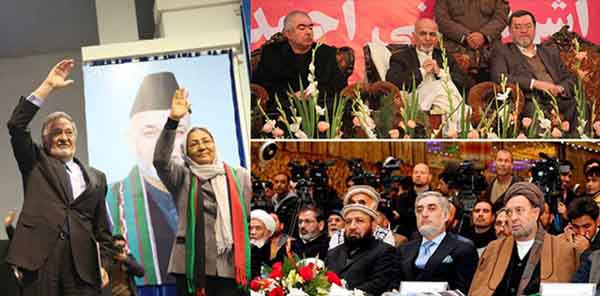Within a decade of passing in a nascent democratic country, Afghan people experienced many challenges bitterly. Now, we are in the threshold of presidential and provincial elections, and the people’s eyes flash with the glimmer of hope. Moreover, the presidential candidates are making mouth-watering promises. Their future agendas and presidential slogans are expressed aptly. But what matters most is that their promises should be followed by commitment, devotion and selflessness. As Afghanistan is an Islamic country, our leader will have to give a particular significance to Islamic law. So, religious values and moral standards are necessary. As an Afghan citizen, I will state some major backlogs which need to be addressed by Afghan future president.
The war in Afghanistan – preceded by decades of conflict – has had a profound impact on many families. Insurgents’ attacks, complex international governance and enduring poverty have made life in Afghanistan particularly challenging for millions of children. Many families who fled the country in earlier years have gradually returned to Afghanistan, but are greeted with, insecurity and poor infrastructure, including a lack of health-care facilities. UN reported in 2013 that “Afghanistan remains one of the most dangerous places in the world to be a child.” Over a third of Afghans are living in abject poverty, violence is escalating as NATO forces withdraw, and years of international aid had done little to decrease the abuse of women and children.
Insecurity and terrorism have wrecked havoc on Afghanistan’s political condition. Afghan people are highly exhausted from militancy and violence. People still lose their family members in acts of terror carried out by religious extremists. Afghan men and women suffer from terrible nightmare caused by the insurgents’ cruelties. Terrorist has changed to a serious issue for Afghan and US forces. It is feared that the religious radicals will blackmail the human’s life around the globe. It was said earlier that Al-Qaeda network intends to attack on the US once more.
The United Nations issued a report stating the number of civilians killed or wounded in Afghanistan rose by 14% in 2013 and expressed deep concern over this increase in its annual reports. According to the report, more than 8,600 Afghan civilians were killed or injured in 2013. The report attributes 74% of civilian deaths and injuries to Anti-Government Elements, 11% to Pro-Government Forces and 10% to ground engagements between Anti-Government Elements and Pro-Government Forces. The UN also asked all groups involved in the war to prevent civilian casualties.
Poverty is one of the serious challenges threatening Afghans’ life. It is said that Afghanistan is one of the most impoverished nations in Asia. With 36% of its population living below the poverty line, Afghanistan is only second to Bangladesh as Asia’s poorest country.
Poverty is mostly heavily concentrated in the rural areas of Afghanistan. While 90% of urban household have access to electricity, only 29% of rural household do. Additionally, 58% of urban households have access to safe water but only 19% of rural homes do.
Opium poppy cultivation is one more challenge in Afghanistan which reached a sobering record high in 2013. According to the 2013 Afghanistan Opium Survey, cultivation mounted to some 209,000 hectares, outstripping the earlier record in 2007 of 193,000 hectares, and representing a 36 per cent increase over 2012.
Moreover, two provinces that had previously been declared poppy-free, Faryab and Balkh in northern Afghanistan lost their status. All in all, opium production in 2013 went up to some, 5,500 tons, a 49 per cent increase over 2012.
The hazard this situation poses to health, stability and development, not only in Afghanistan, is also well documented and has been internationally recognized frequently.
Administrative corruption poses great moral and economic menace to the Afghan people. Bribery, refusing to perform duties, forging documents, lack of conformity to the code of conduct in personal behavior with customers, nepotism, misuse of duties and embezzlement are the challenges across the country.
According to the Transparency International’s 2013 Corruption Perception Index, Afghanistan continues to be ranked at the very bottom. The index, which ranks countries and territories based on how corrupt their public sector is perceived to be, lists Afghanistan in the 175th spot out of 177 countries, with the Democratic People’s Republic of Korea and Somalia taking the two bottom spots.
Afghan people, especially the younger generation, suffer from unemployment. Of course, unemployment does not only pressurize people mentally but cause many challenges in the families and in the society. Whenever a vacancy is announced, nepotism dominates meritocracy. Hence, unemployment, alike other challenges, is an issue which has been neglected by the government.
A decade ago the International Labor Organization warned that long-term stability and prosperity would elude Afghanistan if employment, the kind that guarantees a regular income, wasn’t made a key component of projects to reconstruct this war-ravaged country.
However, aid organizations were reluctant to get involved in job creation, the private sector remained stagnant despite significant investment in telecommunications, and many wealthy Afghans chose to put their money in other countries.
Nowadays, the report said, most Afghans cannot find permanent work, and even temporary work is drying up as international aid money dwindles ahead of the 2014 deadline for the withdrawal of US and NATO combat troops from Afghanistan.
Currently, Bilateral Security Agreement (BSA) is the most controversial issue in the country. On the one hand, President Karzai holds out against signing agreement, on the other hand, the government officials and many Afghan people consider signing the security pact highly crucial in the field of politics, economy and security. Of course, if foreign countries, withhold to support Afghanistan financially and militarily, the security and economic challenges of Afghanistan will be aggravated more than ever before. Hence, I mean that signing security pact between Kabul and Washington, which allows US troops to stay in the country beyond 2014, seems to alleviate the insecurity in the country but was refused to be signed.

